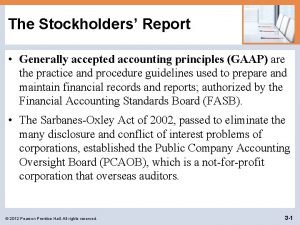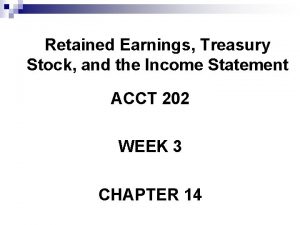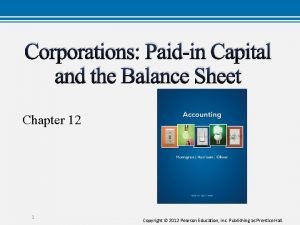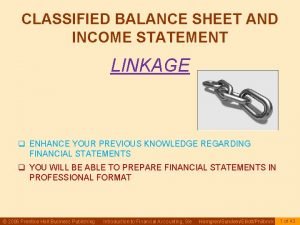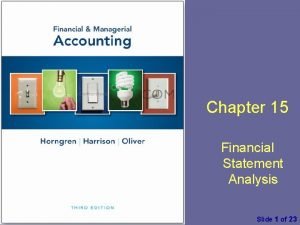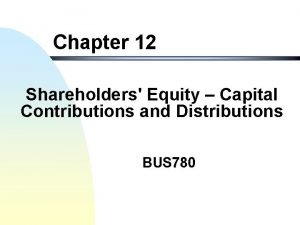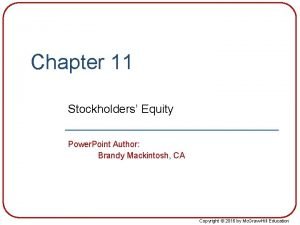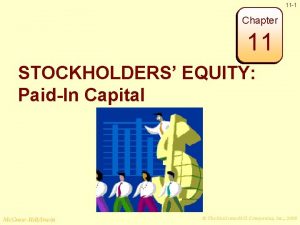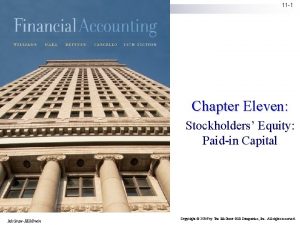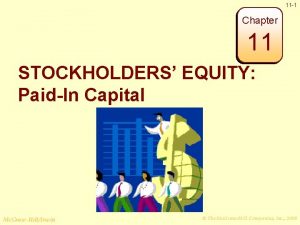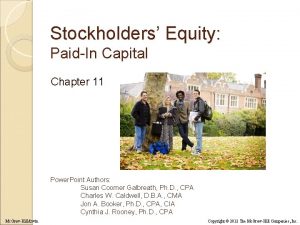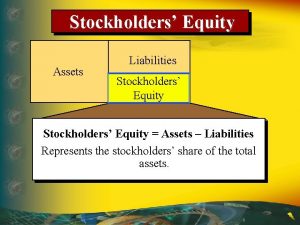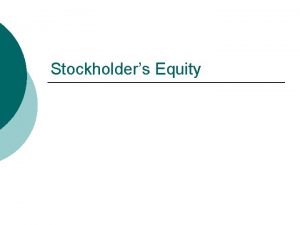Accounting for Corporation Stockholders Equity Paidin Capital Preferred











- Slides: 11

Accounting for Corporation

Stockholder’s Equity Paid-in Capital Preferred Stock – P 50 par, 1, 000 shares authorized, issued and outstanding Common Stock – P 5 par, 30, 000 shares authorized, 20, 000 shares issued and outstanding Paid-in capital in Excess of Par – Common Total Paid-in Capital Retained Earnings Total Stockholders’ Equity P 50, 000 P 100, 000 50, 000 150, 000 P 200, 000 80, 000 P 280, 000 ====

Contributed Capital § Legal Capital – that portion of the contributed capital or the minimum amount of paid-in capital, which must remain in the corporation for the protection of the corporate creditors. § In case of par value shares, legal capital is the aggregate par value of all issued and subscribed shares. § In case of no-par shares, legal capital is the total consideration received by the corporation for the issuance of its shares to the stockholders including excess of issue price over the stated value.

§ Additional Paid-in Capital § The portion of the paid-in capital representing amounts paid by stockholders in excess of par. It may also result from transactions involving treasury stocks, retirement of stocks, donated capital, stock dividends and any other “gain” on the corporation’s own stock transactions.

Capital Stock § The account is credited for the total par value or stated value of fully collected subscription for which stock certificates have been issued.

Subscription Receivable § When subscriptions are received, this account is debited with the total selling price of shares subscribed. § As collections are received from subscribers, this account is credited for the amount collected § The balance of this account is the amount of uncollected subscription.

Subscribed Capital Stock § When subscriptions are received, this account is credited with the total par vlue or stated value of the shares subscribed. § The account is debited for the total par value or stated value of stocks which are fully collected and for which stock certificates will be issued. § The balance of the account represents the total par value or stated value of uncollected stocks or those for which certificates have not yet been issued.

Additional Paid-In Capital § This account is credited for the excess of the total selling price over par value or stated value of stocks.

Methods of Accounting for Capital Stock § Memorandum Entry Method § Journal Entry Method refer to page 95 for data.

Memorandum Entry Method Memo Entry : The corporation is authorized to issued capital stock of P 2, 000 divided into 20, 000 shares with par value of P 100. No. 4 Entry: Cash Capital Stock 100, 000 To record issuance of 1, 000 shares 100, 000

Journal Entry Method Unissued Capital Stock P 2, 000 Authorized Capital Stock P 2, 000 To record the authorized capital stock. No. 4 Entry: Cash Unissued Capital Stock 100, 000
 Well-behaved preferences examples
Well-behaved preferences examples Return on common stockholders' equity ratio formula
Return on common stockholders' equity ratio formula Assets = liabilities + stockholders' equity
Assets = liabilities + stockholders' equity Treasury stock income statement
Treasury stock income statement Return on common stockholders equity formula
Return on common stockholders equity formula Return on common stockholders' equity
Return on common stockholders' equity Classified balance sheet
Classified balance sheet Return on common stockholders equity formula
Return on common stockholders equity formula Return on common stockholders equity
Return on common stockholders equity Stock split accounting entry
Stock split accounting entry Large stock dividend journal entry
Large stock dividend journal entry Assets = liabilities + stockholders' equity
Assets = liabilities + stockholders' equity

